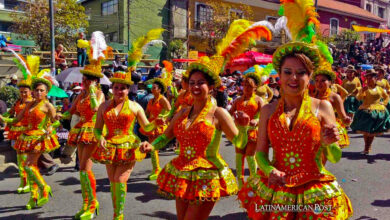What happened to Evo Morales in Bolivia after the elections?
The victory of Luis Arce at the Bolivian polls could imply a return of the popularity of Evo Morales .

The figure of Evo Morales is the axis of debate within the country and Latin American politics. / Photo: DPA / Jair Cabrera Torres
LatinAmerican Post | Ariel Cipolla
Listen to this article
Leer en español: ¿Qué pasó con Evo Morales en Bolivia luego de las elecciones?
Luis Arce was the winner of the elections in Bolivia last month. The former minister of his presidency achieved victory in the first round, through the MAS party. However, there is some skepticism regarding him. For example, from the BBC the current winner of the elections stressed that if Evo Morales wants to help them he will be welcome, but that does not mean that he will be part of the government.
Although according to La Nación, Evo Morales himself announced that he will not be part of the new government (despite giving it his support), his own figure is the axis of debate within the country and Latin American politics. Let's see, then, what the triumph of Luis Arce implies for the popularity of Evo.
The role of Evo Morales in Bolivia
The change of Bolivian government poses, at the same time, some controversial positions with respect to politics. For example, from Clarín they indicate that the return of Evo Morales to Bolivia is not a "priority for his party", because the MAS tries to show a certain distance with the ex-president.
This is due, in the first place, to the fact that the MAS is supposed to try to maintain the good that was done during the government of Evo Morales, although moving away from the personality of the former president. In other words, trying to continue with general economic and social guidelines, as was the case previously, although without his figure being the center of the scene.
For example, CNN had mentioned that a criminal proceeding was opened against Evo Morales for electoral fraud in the last presidential elections, where he had been elected.
This led to the subsequent resignation of the president, who ended up being replaced by Jeanine Áñez, a government that Evo Morales described as a "coup." However, from the perspective of The New York Times, the examination of the Bolivian election data appeared to be flawed, which is why the accusations of fraud, which eventually overthrew the president, would not be true.
What happens is that the problem has even deeper roots. Despite his victory, in Perfil they mention that a referendum had been held to find out if Bolivians were willing for Evo Morales to have a fourth term. In the survey carried out in February 2016, 51.3% voted that Article 168 of the Constitution should not be modified for their nomination.
Also read: How much money is spent on advertising during presidential campaigns?
The problem was, then, that the former president disobeyed the popular clamor and the Electoral Tribunal authorized him to run to remain in office until 2025, according to El Observador de Uruguay. Hence, when he was the winner in the elections, suspicions of fraud were raised. Perhaps due to a misunderstanding: possibly, those who voted "no" preferred a change of candidate and to avoid perpetuation, although they may have supported the MAS.
In other words, the fact of trying to run for a fourth presidential term was controversial, since the Constitution allows only one. His first term, from 2006-2009, seemed "not to count", because it occurred under another constitutional regime. He had his first term between 2009 and 2014, the date on which he triumphed in his “first re-election”.
Therefore, there are different views regarding his future in politics. From DW they believe that it was the "end of a political icon", because, for a long time, Bolivia was considered a place of stability in Latin America. However, these scandals caused an uncertain future in this territory.
For Nueva Sociedad, Evo Morales continues to be popular for building a new order, although it remains to be seen how the mandate of Luis Arce works. In the same way, although he would maintain an official role, remaining outside the government could indicate a possible nomination in the future.





